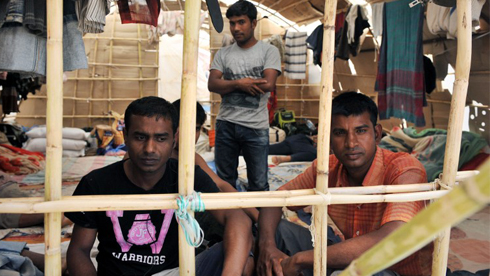Reports of foremen in the strawberry fields of Manolada firing on migrant workers, and the images of victims lying injured in the dirt, hit like a blow from a dagger, like something from another time and place. It confirmed that at many levels, Greece is regressing to behavior unseen for a hundred years. The exploitation of helpless workers by landowners has always been part of the human adventure, just as the downtrodden have made heroic efforts to improve their lot. Greek peasants and workers have played a prominent role in such struggles over the past century, and it is tragic that today we see them treading on the rights of foreign workers, blackening the name of their countrymen and undermining their past struggles.
The crime in Manolada, in the western Peloponnese, was not the first in the area, nor, of course, the first in Greece. Since 2006, we have known that migrant fruit pickers – mainly from Bangladesh – work under terrible conditions for paltry pay at Manolada, without rights or protection. It was also known that employers directed foremen to use violence. The situation was similar in many other places, and it affected undocumented migrants as well as many who had been here for years already. Generally, we knew that exploitation and injustice were the rule.
Only 100 years ago (in 1907 to be precise), Greek landowners had ordered the murder of Marinos Antypas, an activist who was organising the landless peasants of Thessaly. Three years later, the battle between peasants and state officials at Kileler in Thessaly became a landmark in the Greek farmers’ emancipation movements.
But the struggles of the Greek workers were not limited to Greece. Ilias Spantidakis of Crete, who became known as Louis Tikas in the United States, earned a place in the history of the US labour movement when he led a major strike by Colorado coal miners. He was murdered on April 20, 1914, along with another 18 or so striking workers, by militia serving the interests of mine owners. All over the world, Greeks have battled for human rights. In South Africa, lawyer George Bizos remains on the frontline of the struggle for justice, from defending Nelson Mandela at his trial in 1963-4 to representing the families of mine workers killed by police at a protest last year.
Foreign workers have kept Greek production alive over the past years, often suffering great deprivation. They have a right to humane working conditions and reasonable pay, rather than be left to the mercy of brutal employers and the indifference of the state, which neither protects them nor punishes those who commit crimes against them.
To honour what makes us proud about our past, all of us – farmers, the police, the judiciary, and especially we citizens – must take our country back from the barbarians who move with impunity among us.
Reactions
Boycotting the “Strawberry Mafia"
Ta Nea reports that Greek police have arrested three foremen overseeing strawberry-pickers in Manolada for allegedly shooting and wounding the 30 seasonal migrant workers who had shown up to demand six months of unpaid salary.
The shooting has caused an "outcry against the strawberry mafia", headlines Ta Nea. Calls for a boycott of the "bloody strawberries" began to circulate the web after the case exposed the methods used by agricultural enterprises of the region: overexploitation and psychological and physical violence against the mostly Bangladeshi seasonal workers who lodge in makeshift shacks and earn 20 euros a day – if the foremen don’t simply hand them over to the police to save paying their salaries.
Was this article useful? If so we are delighted!
It is freely available because we believe that the right to free and independent information is essential for democracy. But this right is not guaranteed forever, and independence comes at a cost. We need your support in order to continue publishing independent, multilingual news for all Europeans.
Discover our subscription offers and their exclusive benefits and become a member of our community now!












